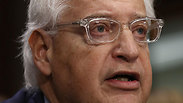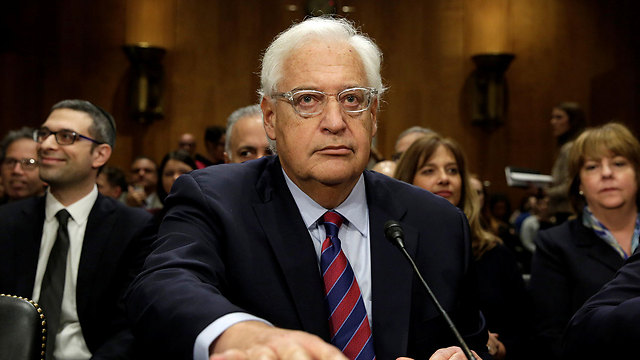
Keep religion out of politics
Op-ed: The Reform Jewish movement’s protest will not stop David Friedman’s appointment as US ambassador to Israel, but it definitely harms the movement’s own status among Israeli society.
Religion and politics are a dangerous mixture. Always. In Israel, as well as in any other place in the world. Last week, the Reform Jewish movement decided to oppose David Friedman’s appointment as the US ambassador to Israel. What does a religious denomination have to do with political appointments? Nothing.
Several days earlier, I got to sit with a group of Jewish leaders, including Reform rabbis. They presented difficult arguments about Israel. Some of them are justified. The Jewish state cannot ignore the largest Jewish denomination in the United States. Israel cannot ask for their support and then disregard them.
Every few months, they turn to the Israeli consuls and officially complain about the ultra-Orthodox monopoly and the control of religious services in Israel. The protest is received in Jerusalem in a telegram and placed in the drawer. Prime Minister Benjamin Netanyahu, who has many Reform and Conservative donors and whose second wife underwent a Conservative conversion, listens, expresses his solidarity, and brushes the issue aside. So does Bayit Yehudi leader Naftali Bennett, whose parents became Zionist through the Conservative denomination.

I met with a few of those rabbis to let them blow off some steam, and also to make them understand that Israel is more complex than what they see from there. Religious pluralism is not a monopoly that belongs to Israel’s Left, and political views about the chances of peace and the two-state solution in the 1967 borders have nothing to do with the solution of religious disputes after 2000 years of Jewish arguments. I find it outrageous that the Haredim have turned them into outcasts. After all, both Haredi and Reform Jews are a new phenomenon in Jewish history.
In the end, I told them that if they want to make a difference, they should perhaps stop whining and come to Israel. Israelis don’t live between the pages of Haaretz newspaper or in the Meretz party. The battle over the State of Israel’s character is taking place in the Bayit Yehudi party between the liberals and the conservatives, in the Likud and in all places where there is no hesitation over the need for a clear Jewish identity and a clear nation state.
We ended the conversation on good note. Both sides agreed that mixing religion and politics is fatal.
But last Friday it turned out that only others find these conclusions efficient. David Friedman’s appointment brought the politics out of the Reform movement and made it completely identical to the liberal J Street organization.
Friedman is not a clean slate. In the past, he wrote a problematic article in the Besheva website. The words he chose to use in describing J Street were in the style of the Republican Tea Party or the radical right wing in Israel, but his opponents are not troubled by his choice of words, they are troubled by his political affiliation.
Here is what they wrote: “Mr. Friedman lacks the basic qualifications for the position. Unlike every other past holder of this important position, Mr. Friedman has no professional foreign policy experience. He has never been involved in these issues other than as a zealous partisan and financial supporter of settlement activity.”
It’s safe to assume that if we were talking about a different Friedman—New York Times columnist Thomas Friedman, for example—everything would appear different. If it were about him, the Reform movement would have likely published supportive ads in all newspapers. His inexperience and his support of a return to the 1967 borders would have been perceived as a badge of honor. The first Friedman, on the other hand, “lacks basic qualifications.”
I have never met the designated ambassador, I am unfamiliar with his qualifications, but I did follow his Senate hearing, and he spoke there like every other ambassador before him. His personal views in favor of the settlements even sounded restrained.
When he arrives, he will step into the shoes of Dan Shapiro, who was an excellent ambassador. Shapiro implemented President Barack Obama’s policy even when he understood reality better. Friedman will implement Trump’s policy when he decides what it is (and I am not convinced that there is a policy). Like Shapiro, he will have to get to know all parts of Israeli society, including those that are far away from his views. The most important qualifications he needs is to be a human being, to know how to shake hands and to smile at people. At some moments, he will have to have patience during boring ceremonies.
The Reform movement’s protest will not stop Friedman from reaching the US embassy in Tel Aviv or in Jerusalem, but it definitely harms the movement’s own path into Israeli society. We are responsible for them as the Jewish state. They are responsible to fulfill what they themselves are demanding.










